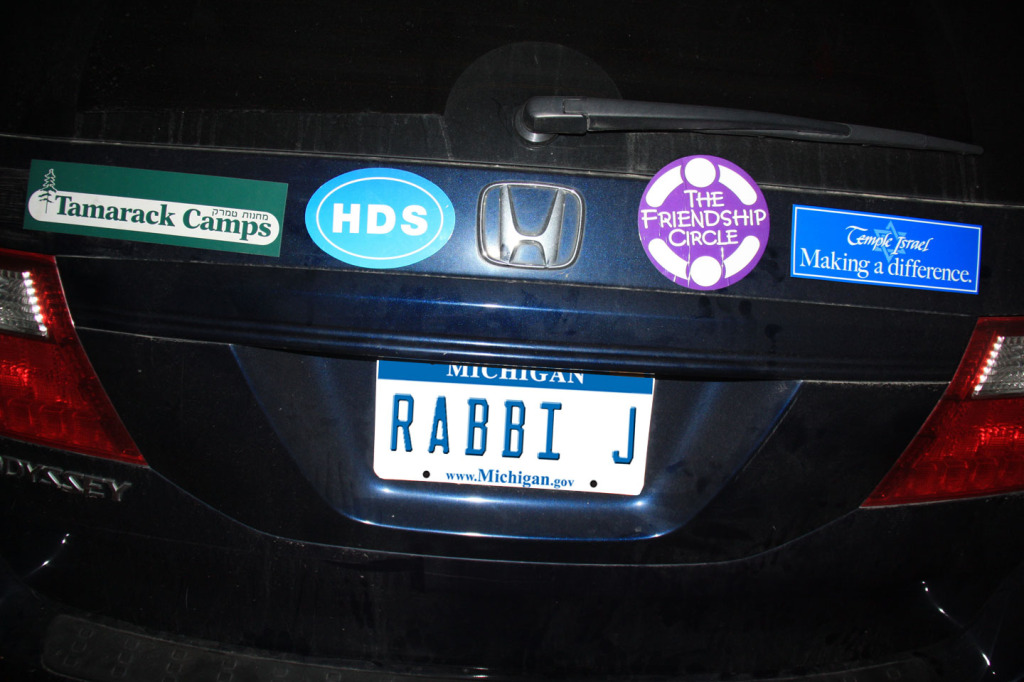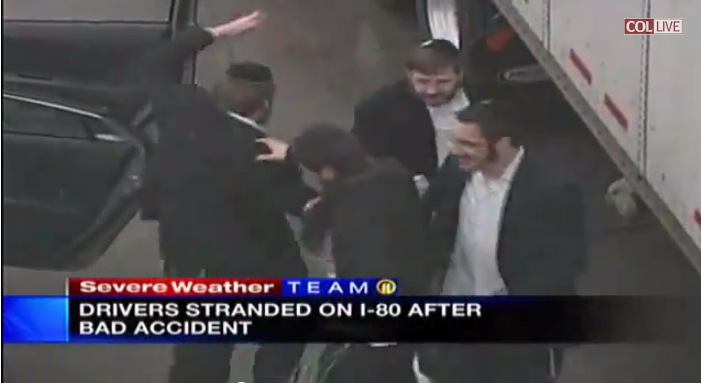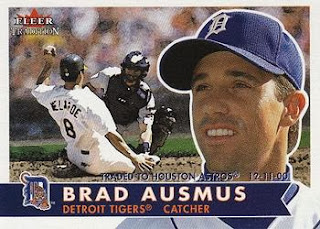A few years ago, several local Metro Detroit Jewish organizations began giving out bumper magnets (bumper stickers 2.0?) to promote their organizations. I had collected a number of these and thought it would be funny to affix them all on the back of my wife’s minivan’s bumper for a photo. I Photoshopped a personalized Michigan license plate that read “Rabbi J” and then posted the photo to my Facebook page. A couple week’s later learned that it had been the opening for a sermon delivered by my friend and colleague, Rabbi Paul Yedwab of Temple Israel in West Bloomfield, Michigan. It’s a wonderful D’var Torah on this week’s Torah portion, Parshat Vayera, and I thought I would post it here for others to enjoy and learn.
Vayera: Labels
By Rabbi Paul Yedwab,
Temple Israel (West Bloomfield, Michigan)
A friend of mine, Rabbi Jason Miller, whom many of you know, recently tagged a photo on his Facebook page showing a car bumper with a Temple Israel bumper sticker magnet (available by the way, on the table just outside the door if you’d like to sport one on your vehicle.) And, in this picture, right next to the Temple Israel sticker, is a Friendship Circle bumper sticker, a Hillel Day School bumper sticker and a Tamarack Camps sticker as well. And the caption under the photo reads: “Time to get a second bumper.”
I have long been fascinated by this concept of labels. Is the owner of a car really defined by the labels on her bumper? And if she were, how many bumpers would she need to let us know that she is a proudly Jewish, caring mom, tree hugger, vegetarian, Zionist, who is politically moderate, loves animals, nature, Swirlberry frozen yogurt, crossword puzzles, Gucci, Glee and her alma mater. Forget a second bumper; she would need a tractor trailer.
In our Torah portion, God is speaking to Abraham and telling him that he is going to have to take his son up to Mt. Moriah, there to sacrifice him on the altar. But the words God uses to break the bad news are very deliberate. Take your son, God begins, bincha, and then y’echidcha, your only son, asher ahavtah, the son you love, and then and only then, God finally identifies Isaac by name.
Now classically, the Midrash tells us that God stretches out his description of Isaac in order to break the bad news to Abraham slowly…gently. But I am not satisfied with that explanation. After all Abraham was not an idiot; he knew exactly to whom God was referring from the very beginning of that dreadful conversation.
So here is another interpretation. In our tradition God is the one being in all the universe who is ineffable, which means beyond labels. God is not a male or a female, a Democrat or a Republican (although you would never know it from some of the political ads that have cropped up recently). And, according to the Torah, God does not even have a name other than Ehiyeh Asher Ehiyeh, I will be what I will be, or in other words, you can’t put a label on Me. And therefore it follows that, since we human being are made in God’s image, God understands us too as holistic, complex, multi-dimensional creatures. No single label can fully capture the essence of a person. You know, that rabbi with the gray hair at Temple Israel. No, no, not him….the other one…the short one. Oh! Rabbi Yedwab. Labels really never tell the whole story.
So God tries to supply a multi-dimensional description of Isaac, whom after all is so much more than his position in the family, or the feelings his father has for him, or even his name. You know, Abraham: Isaac, the one whose essence is way beyond what any name, label or verbal description can possibly capture, your son, Yitzchak.
I think I was led to read the Torah in this way this week by some interesting new research that has been done recently into the field of language and epistemology. This researcher claims that language does not follow the development of thoughts, as was previously believed, but that in fact, language creates the thoughts—indeed is the thoughts. That, as babies we have islands of understanding and perception in our brains that can only be connected when we learn the words that tie them together. So we may understand the concept blue, for instance, and ball, and door, and left, but it is only words which help us to link the concepts so that they become useful thoughts. “Oh,” says the toddler to himself, “my favorite ball is to the left of the blue door.” And off the happy toddler goes to retrieve it, and probably throw it at the poor dog sleeping peacefully over in the corner minding his own business.









